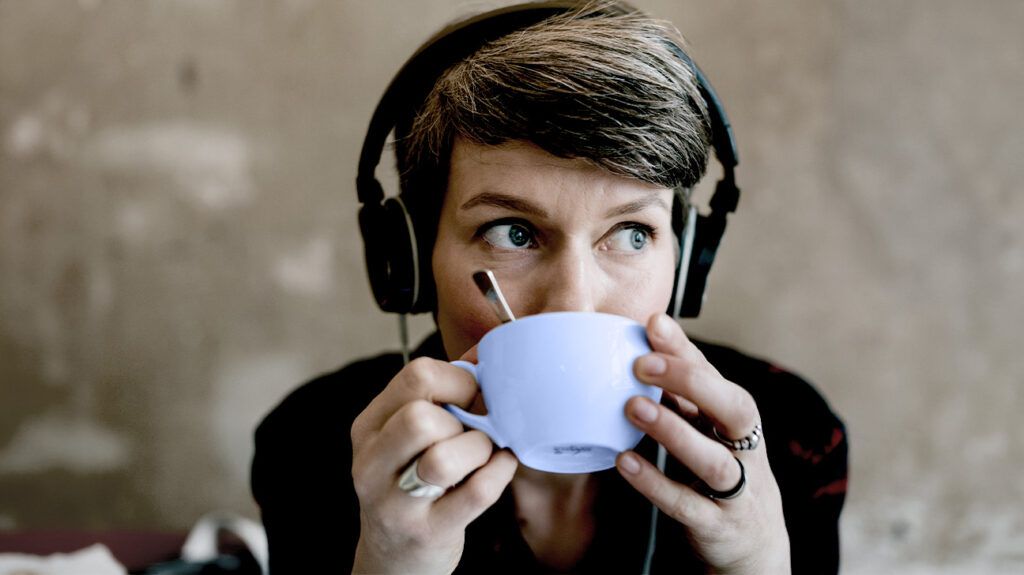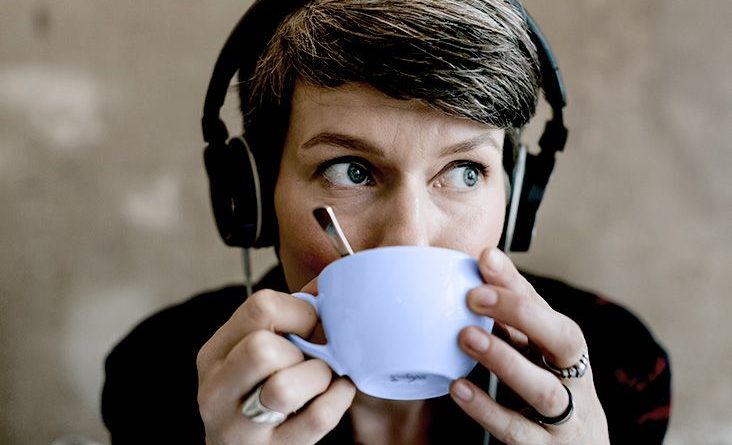Brain health: AI music, coffee may help boost cognitive performance

- A new system tracks brain waves to provide a feedback system that may help people achieve stronger cognition and productivity.
- The authors of the study envision utilizing safe, noninvasive stimuli to encourage desired brain states.
- The study found that listening to music and drinking coffee can incite higher levels of beta band power in brain waves.
Many scientists hope that machine learning and artificial intelligence (AI) may one day provide tools with which we can boost our sense of well-being and cognitive performance in our lives and at work.
In pursuit of this, a new study from NYU’s Tandon School of Engineering describes their MINDWATCH algorithm, which non-invasively captures brain-state data.
MINDWATCH analyzes a person’s brain activity from data collected by a wearable device on their wrist and from a headband.
In the study, the researchers prompted different brain states using what they call “safe actuators.” These included sounds, tastes, and smells.
The study investigated the promotion of “beta band” brain wave activity associated with optimal cognitive performance using safe actuators.
The researchers found that listening to music and drinking coffee were both linked to stronger beta band activity. They also tested perfume, which reduced beta band power from baseline but increased performance levels in other cognitive tests.
One of the interesting findings of the study is that AI-generated music produced stronger beta band signals than traditionally produced music.
The study is published in Scientific Reports.
Beta-band activity and concentration
Continually oscillating electrical voltages in the brain are referred to as brain waves. There are five recognized rates, or “frequencies,’ at which they oscillate from their lowest to their highest voltages:
- gamma band waves — oscillate at a frequency above 35 Hertz (Hz), or more than 35 times per second. Previous research associates gamma waves with the mental act of concentrating.
- beta band waves — oscillate from 12 to 35 Hz. This band has been linked to anxiety, attentiveness, and being mentally active.
- alpha band waves — have a frequency of 8 to 12 Hz, and are linked to paying passive attention and being relaxed.
- theta band waves — have a frequency of 4 to 8 Hz and are associated with being very relaxed, with one’s focus turned inward.
- delta band waves — occur during sleep and have a frequency of .5 to 4 Hz.
In the new study, the researchers found differently shaped relationships between beta band power and performance in different individuals.
In one participant, the relationship was linear, with higher beta band power associated with higher performance. However, in another participant, the relationship was an inverted U-shape, meaning a moderate beta band power was associated with maximum performance for them. The authors highlighted that these results show the need for an individualized understanding of a person’s brainwave patterns to interpret findings.
The impact of music, coffee, and perfume
Going a step further, the authors of the study exposed participants to three safe actuators: music, coffee, and perfume.
The researchers found that listening to music of various genres produced a consistent increase in beta band activity, with AI-produced music resulting in the strongest effect.
Drinking coffee also resulted in a significant boosting of signals in the beta band, while smelling perfume dropped the beta band power, but improved performance in other measures.
Testing AI music’s effects on the brain
The study’s success with AI-produced music shows that a safe actuator such as music can be optimized for increasing beta band activity.
“In this research, we utilized deep-learning neural networks to compose new music based on music preferred by each individual,” said Dr. Hamid Fekri Azgomi, lead author of the paper.
“Our approach involved exposing subjects to renowned, soothing music tracks to gauge their personal inclinations,” he told Medical News Today.
The participants were asked to identify their preferences using examples from three musical datasets: classical music, including works by Ludwig van Beethoven, Johann Sebastian Bach, and Frédéric François Chopin; “fantasy music” including music from video games such as Final Fantasy and Mario; and jazz, which featured songs by Frank Sinatra and other jazz artists.
How MINDWATCH works
Senior author Dr. Rose T. Faghih explained the MINDWATCH technology allows wearable devices to operate as brain-computer interfaces. The goal is to “decode internal brain states of cognitive arousal and performance, making it feasible to track and improve these cognitive states for everyday life applications.”
According to Dr. Faghih, “Autonomic nervous system activations result in microvariations in sweat activity, which lead to changes in the electrical conductance of skin that can be measured using some wearable devices.”
In the study, researchers used Empatica E4 wristbands and Muse headbands to capture and observe the participants’ brain waves.
Dr. Faghih said they hope that this noninvasive means of monitoring brain wave activity may one day offer “personalized enhancement of cognitive well-being and performance in diverse contexts through noninvasive means.”
Dr. Faghih said that other safe actuations under consideration are soothing visual stimuli — perhaps images of peaceful scenery — meditation, gentle vibrations, or haptic feedback, virtual reality technologies, and PARO therapeutic robot experiences.
MINDWATCH’s dual goals
“MINDWATCH aims to eventually enable real-time regulation of cognitive arousal and performance states for improving mood and performance in a personalized, adaptive, and robust manner,” said Dr. Faghih.
In addition, the researchers hope their system will “fill the existing gap of the lack of publicly available datasets” for use by machine learning.
Although this study focuses on beta band findings, Dr. Azgomi said, “our extensive dataset can enable future investigation by other researchers for other significant features.”
“These untapped insights hold the potential to enrich our comprehension of human neurophysiology, offering a more holistic understanding of cognitive dynamics.”
— Dr. Hamid Fekri Azgomi
Source: Read Full Article



